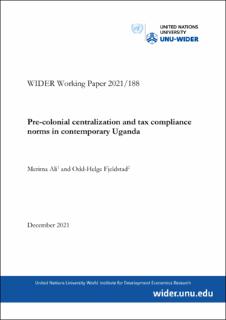Pre-colonial centralization and tax compliance norms in contemporary Uganda
Original version
Helsinki: UNU-WIDER (WIDER Working Paper no. 188) 33 p. 10.35188/UNU-WIDER/2021/128-0Abstract
The paper examines the legacy of pre-colonial centralization on tax compliance norms of citizens in contemporary Uganda. By combining geo-referenced anthropological data on pre-colonial ethnic homelands with survey data from several rounds of the Afrobarometer Survey, respondents from the historically centralized homelands are found to exhibit a higher willingness to pay tax compared to respondents from non-centralized areas. The result holds for the whole sample and in the regression discontinuity analysis on individuals who reside close to the borders of neighbouring ethnic homelands with different levels of pre-colonial centralization. The stronger norm for tax compliance in pre-colonial centralized homelands is explained by the legacy of location-specific factors related to the level of capacity that historically centralized states had in upholding authority and not through the legacy of better-quality local institutions.
